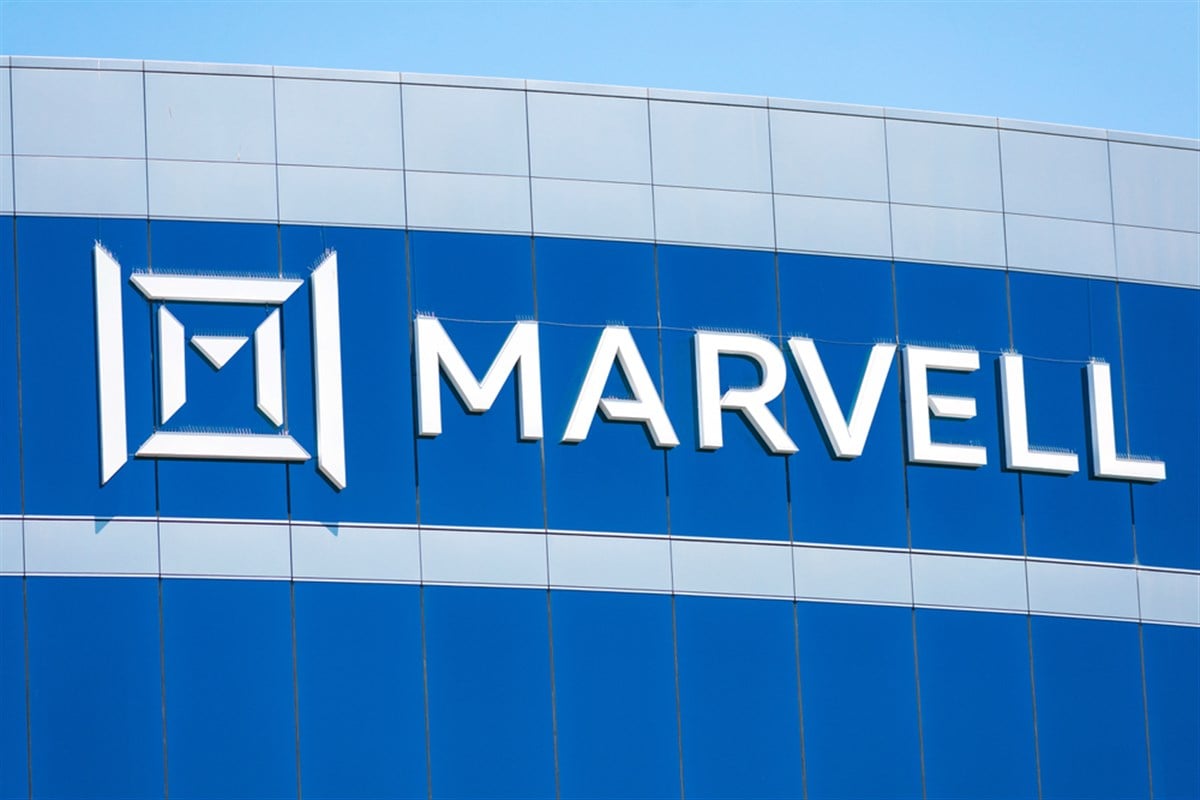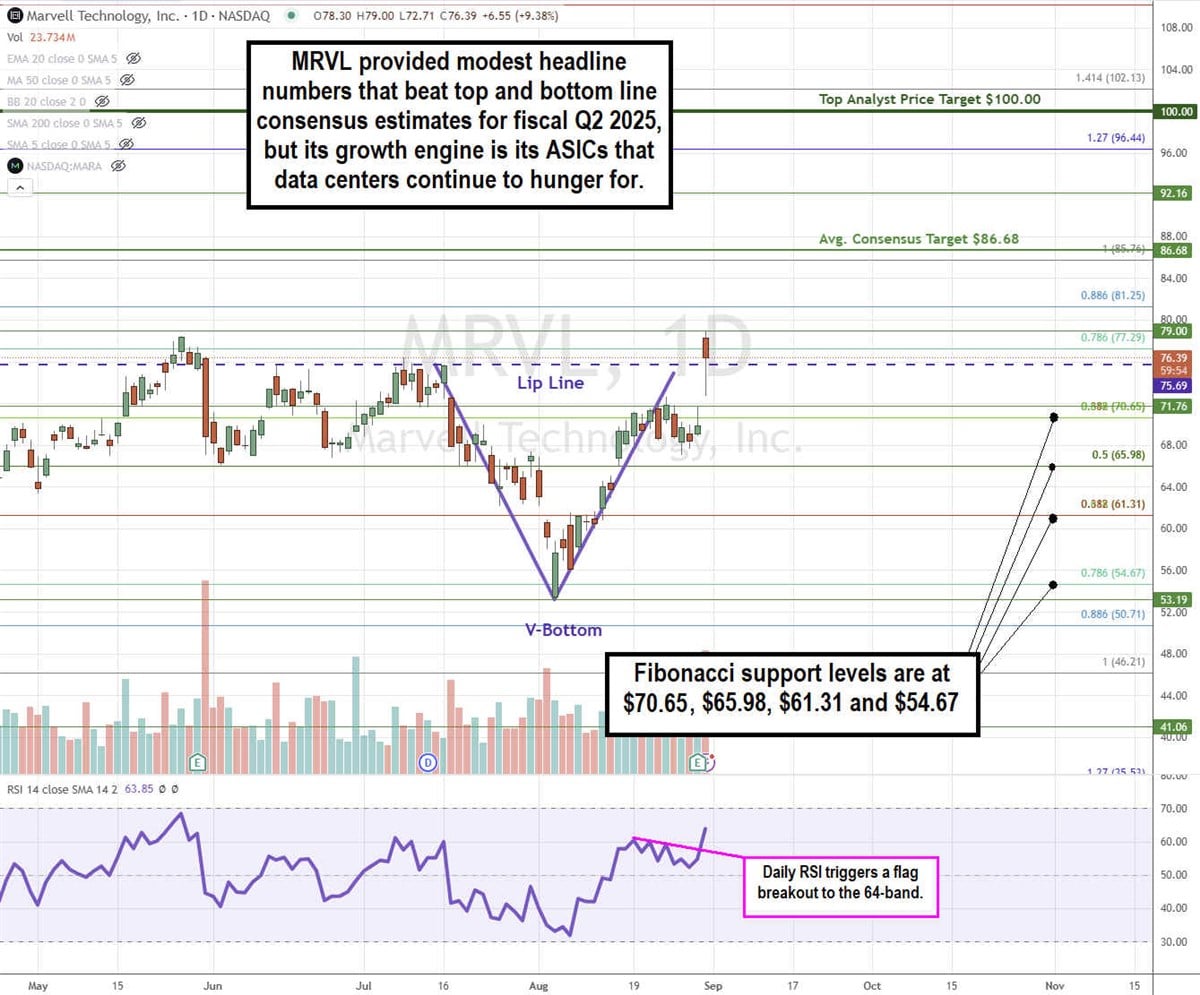
While semiconductor developer Marvell Technology, Inc. (NASDAQ: MRVL) is a benefactor in the artificial technology (AI) revolution, headline numbers for their second-quarter fiscal 2025 results don’t paint the immediate upside potential. This is because the rest of the business shows weakness from the non-AI semiconductor cycle slowdown. Their growth segment lies in the viral expansion of data centers, which are benefiting from the surge in AI adoption.
Like many peers in the computer and technology sector, Marvell competes with chip companies that also develop application-specific integrated circuits (ASICs) and storage and communications chips like Broadcom Inc. (NASDAQ: AVGO) and Micron Technology Inc. (NASDAQ: MU).
Custom ASICs Are Marvell’s Growth Runway
Application-specific integrated circuits (ASICs) are customized computer chips built for specific tasks. In Marvell's case, these are specialized hardware blocks that accelerate AI specific workloads like inference, using data to make predictions and decisions, and deep learning training for AI models. ASICs are used in storage controllers, enabling faster data storage and retrieval, which is critical for AI applications as they require access to oceans of data quickly. Hardware-specific blocks include tensor cores and matrix multipliers. In a nutshell, these significantly improve energy efficiency and performance on a higher level compared to running tasks on a general-purpose GPU or CPU.
ASICs: Precision Processing And Lower Power Consumption
AI models are constantly evolving; Marvell's ASICs are tailor-made to support specific AI architectures and frameworks, ensuring optimal performance specific to each client's needs. Since they are calibrated for specific tasks, they are more energy efficient due to lower power consumption compared to general-purpose processors.
Marvell Nearly Doubles Data Center Business
Data centers can’t get enough of ASICs, as evidenced by the doubling of data center revenues posted in Marvell’s fiscal second-quarter 2025 earnings. Data center revenues surged by 92% YoY and 8% quarter-on-quarter (QoQ) to a record $881 million. This is all attributed to the strong demand from AI applications and the continued ramping of customer AI compute silicon.
Enterprise Networking Has Bottomed Out
Marvell reported fiscal Q2 2025 earnings-per-share (EPS) of 30 cents, matching consensus analyst estimates. As strong as data centers were, total revenues fell 5.1% YoY to $1.27 billion but still beat consensus estimates for $1.25 billion. Its legacy enterprise networking market saw revenues collapse 52% to $151 million but only fell 1% QoQ as inventory levels are beginning to normalize. Customers are also seeing their orders improve. Marvell expects its enterprise networking revenues to start to ramp back up with single-digit sequential growth starting in the next quarter, with further improvements in fiscal Q4 2025.
The Carrier Infrastructure Segment Suffered the Worst Drop
Marvell reported a 72% YoY revenue drop in its Carrier Infrastructure segment, coming in at $76 million. However, it improved by 6% QoQ. This company is forecasting a recovery driven by inventory normalization and the start of its 5-nanometer product cycle. Revenues if expect to grow by single digits starting in fiscal Q3 2025 and further improvements in Q4 2025.
Automotive and Consumer Segments Continue to Bottom Out
Marvell's 2 lowest revenue-generating segments, Consumer and Automotive, saw YoY revenue declines of 47% and 31%, respectively. However, their QoQ revenue surged by 112% for its Consumer segment to $89 million and fell just 2% for Automotive to $76.2 million. They are both expected to return to mid-single-digit QoQ growth starting in the fiscal third quarter of 2025.
Data Center Thriving As Other Segments Are Finally Improving
Marvell’s ASICs and electro-optic rollouts are expected to accelerate and extend its growth runway. Electro-optics are vital for high-speed interconnect to move data with low latency in data centers. Its smaller segments are showing improvement driven by inventory normalization as its legacy semiconductor cycle looks to be bottoming out. These are the fundamentals underscoring the sharp reversal on the candlestick charts, which point towards another leg up.
Management is Being Conservative with Guidance
Management is being conservative in providing in-line guidance as it forecasts fiscal Q3 EPS of 30 cents to 45 cents, firmly above the 30 cents consensus estimates. Still, revenues are expected to come in between $1.38 billion to $1.52 billion, indicating a +/- 5% YoY revenue range versus $1.41 billion consensus estimates.
MRVL Stock Forms a V-Bottom Reversal Pattern
A V-Bottom pattern is comprised of 2 trendlines. The first starts at a peak and connects to the bottom, which then connects a trendline back up to the peak. The peak is also called a lip line. The lip line can comprise a double-top until it gets broken and then acts as a support on pullbacks. This is the same dynamic that formed on MRVL stock as it fell from the $75.69 lip line peak to the $53.19 bottom and bounced back up towards the lip line heading into its second-quarter earnings release.

MRVL gapped up to peak at $79 on its second-quarter earnings release and retested the lip line as it attempts to stabilize as a support. The daily relative strength index (RSI) is powering up through the 64-band. Fibonacci (fib) pullback support levels for MRVL are at fib support at $70.65, $65.98, $61.31 and the $54.67 V-Bottom low. Marvell’s average consensus price target is $86.68 and its highest analyst price target sits at $100.00.
Options Strategy Consideration: Seasoned options traders might consider using cash-secured puts at the pullback levels or administer a wheel strategy to enter on pullbacks and generate income.













